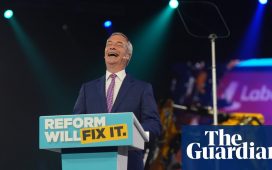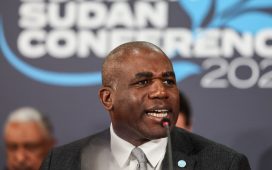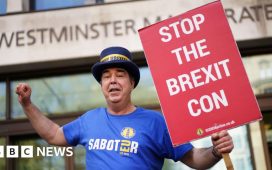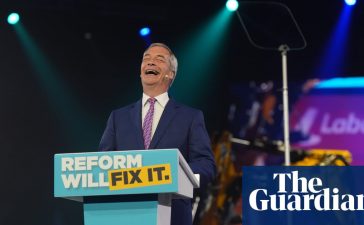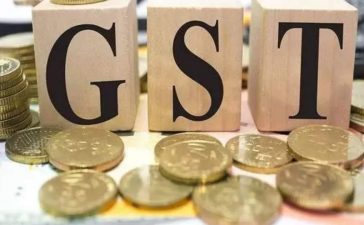“I think he’s past hope now really: we need a change.” Former Conservative voter Kevin Sinclair, jumping on his bike after a pub lunch in sunny Stratford-upon-Avon, has little hope for Rishi Sunak’s latest reset – the tax-cutting plans mooted for Wednesday’s autumn statement.
“I can’t believe that he’s had David Cameron back in. It doesn’t reassure me at all,” says the 65-year-old. Asked if his scepticism is widely shared in this true blue Tory seat, he says: “It is with a lot of my friends and family, yes. I think things are going terrible.”
Cameron’s surprise reappearance at the cabinet table, and Jeremy Hunt’s heavily trailed tax cuts, are seen at Westminster as a last-ditch attempt to reel back in the traditional Tories who deserted the party in their droves in recent byelections.
But it comes at a time when the cost of living crisis is biting, even in this affluent half-timbered town in the heart of England – the constituency of tbe former chancellor Nadhim Zahawi.

Corin Crane, the chief executive of the Coventry and Warwickshire chamber of commerce, says local businesses, many of which are heavily reliant on tourists drawn by Stratford’s Shakespeare links, are feeling the squeeze.
“Visitor numbers are fairly strong – people are still coming – but the amount that they spend tends to go down,” he says. “Retailers are really struggling with the cost of living crisis for their customers. And the cost of doing business is really hard.”
During the pandemic, economists at KPMG identified Stratford’s as among the worst-hit local economies nationwide, because of its reliance on tourism and hospitality.
Crane echoes the call of the British Chambers of Commerce nationally for business rates reform to help the high street compete with online. “Budget after budget after budget we get promised business rates reform,” he says, adding that some firms are also struggling to recruit the staff they need.
On this bright autumn day, Stratford’s town centre appears busy with tourists and school groups, aside from the odd empty shop, including a large former Debenhams.
But at perhaps its biggest draw, the Royal Shakespeare Company theatres, which attract more than 1 million visitors a year, revenues have not yet fully recovered since Covid.

“We’re nowhere near pre-pandemic levels, in terms of box office income, in terms of audience numbers,” says Sandeep Mahal, a leadership associate at the RSC.
“The cost of living crisis has depressed that income potential. Where people may have gone to the theatre three or four times a year, they may only go once or twice a year.”
She urges Hunt to extend the more generous rate of theatre tax relief introduced during the pandemic to aid struggling cultural institutions, which is due to be tapered off.
“In terms of the autumn statement coming up, there are things government can do, and the thing I would absolutely prioritise is maintaining the higher theatre tax relief,” she says, adding, “we’re still struggling, and there are enormous challenges.”
Like so many businesses up and down the UK, the RSC would also like to see better transport links: it has been piloting a late-night bus service, the X18, to take theatregoers back home to nearby Warwick, Coventry and Leamington Spa, because local train services stop before the last show ends.
In another reminder of the cost of living crisis, Mahal highlights the fact the RSC has been opening up the cafe at The Other Place theatre one day a week as a Warm Hub, as part of a network of local spaces that have sprung up to help consumers weather rocketing fuel prices.
Their existence underscores the fact that many families in Stratford are having to make much more heartbreaking choices than whether to cut back on theatre trips.

Karen Williams and Sarah Cowley-Catchpole, of local charity Escape Arts, are preparing to take their Grotto on the Go out on the road – bringing Father Christmas to children who might otherwise miss out.
Last year, they visited 256 children, with referrals coming from schools, other charities and members of the public. This year, demand has increased significantly – and they will not only be delivering toys, but parcels of food and toiletries for cash-strapped families.
“The issues in Stratford are the same as anywhere else,” says Cowley-Catchpole, who coordinates the arts charity’s work with local young people.
after newsletter promotion
“There are huge financial issues,” agrees Williams. “And it makes that divide even greater, because the perception of affluence makes those people who aren’t, feel even more isolated and removed.”

Manuela Perteghella, the Lib Dems’ parliamentary candidate for Stratford-upon-Avon, says families’ financial struggles come up repeatedly in conversations with voters.
“After the catastrophic mini-budget, many, many, many families have seen their mortgages go up, so obviously that’s had an impact,” she says.
Zahawi held this seat with a majority of almost 20,000 in the 2019 general election. It has been Conservative since its creation in 1950, aside from a two-year aberration when Alan Howarth defected to Labour in the mid-1990s.
But the Lib Dems took control of Stratford district council in May’s local elections – and have been buoyed up by the dramatic swings achieved in recent parliamentary byelections in other traditionally Tory constituencies.
Despite being sacked by Sunak for failing to fully declare his tax affairs, after the Guardian revealed he had reached a seven-figure settlement with HMRC, Zahawi has been selected to stand againin the general election expected next year.

Local voter Richard Steele, 53, who works in the horse racing industry, expresses surprise that Zahawi remains the candidate.
“If me and you did tax avoidance, we’d be going to prison, and he’s supposed to be representing us. I’m sorry, he doesn’t represent me and my values. I go to work, I work hard: I’ve got two jobs and I pay my taxes and bills like everybody else.”
“I think it needs change,” he adds. “I think the whole thing’s a mess really, the Conservative party: I don’t support them, but I’ve got friends that do, and they say they’re not going to vote for them.”
Not all local Conservatives are happy either: the former Tory council leader Tony Jefferson told the Stratford-upon-Avon Herald after the local elections: “The strong feedback from an awful lot of Conservatives from the doorstep was that Nadhim should have gone.”
Perteghella says the issue is much broader than Zahawi alone. “We’ve talked to lifelong Conservative voters who don’t feel that the party belongs to them any more. They feel let down,” she says.

This sentiment – that it’s “time for a change” – recurs repeatedly in conversations here. Stratford’s most famous local once wrote of “a tide in the affairs of men, Which, taken at the flood, leads on to fortune”.
Hunt is hoping he can offer something on Wednesday to tempt disaffected Conservatives back into the fold. But it may prove futile, if after 13 tumultuous years, the tide has already turned.

